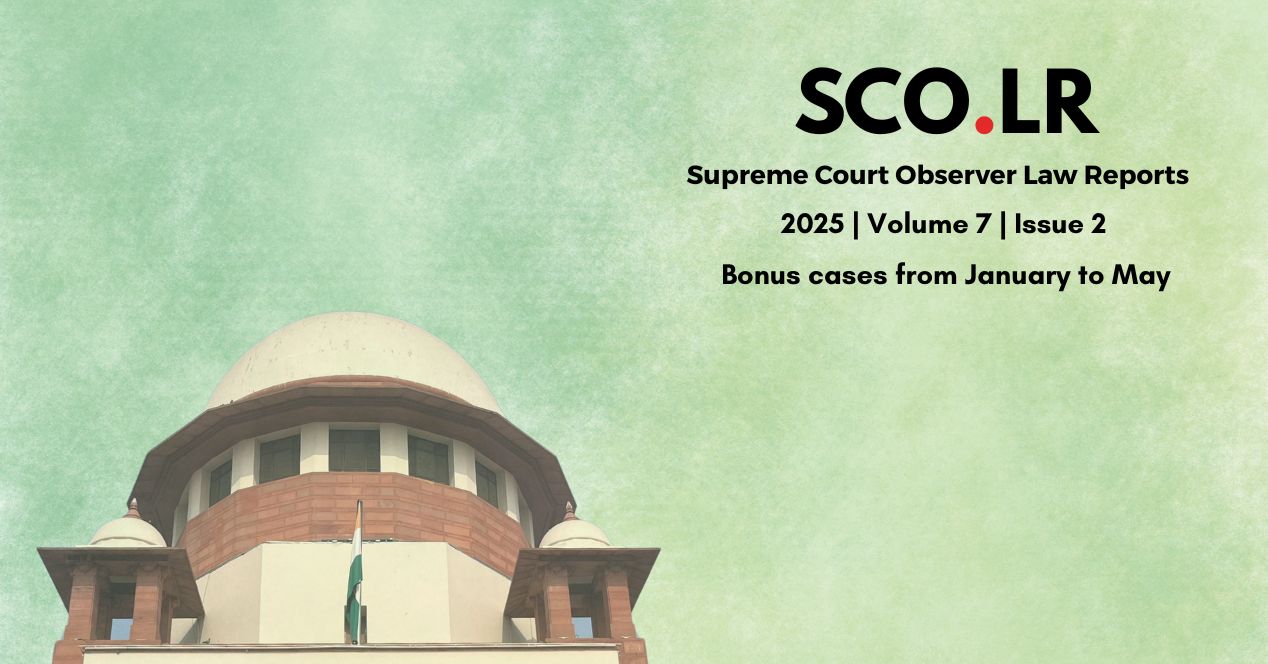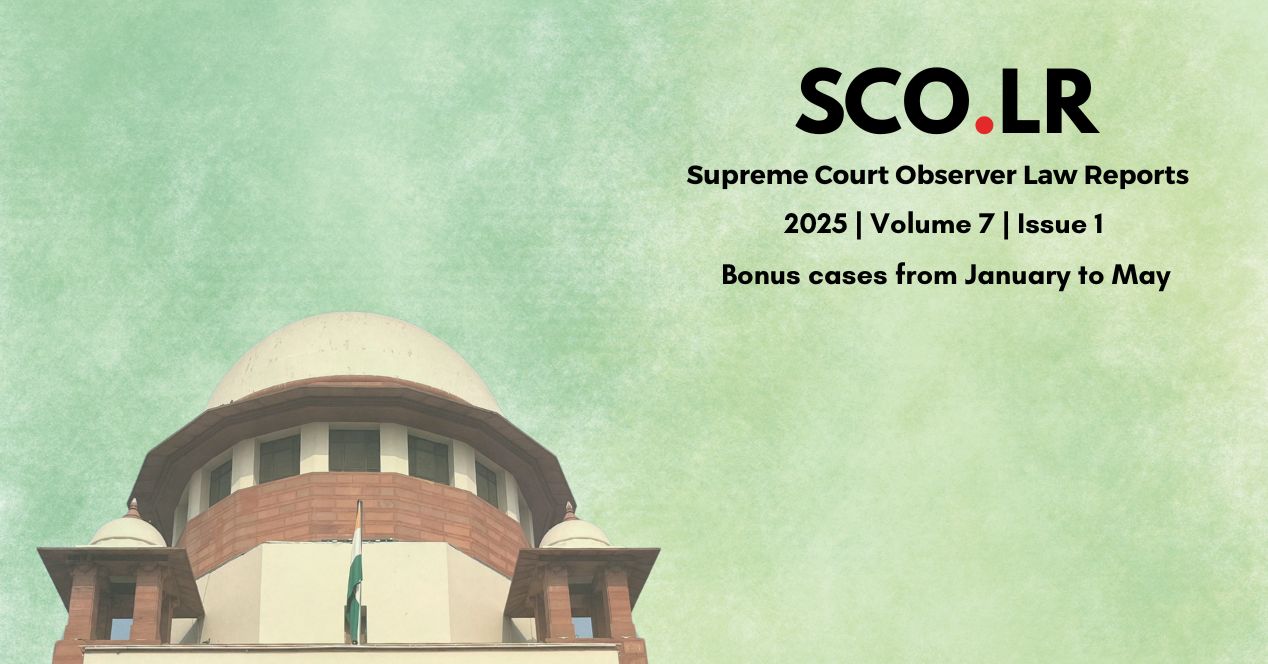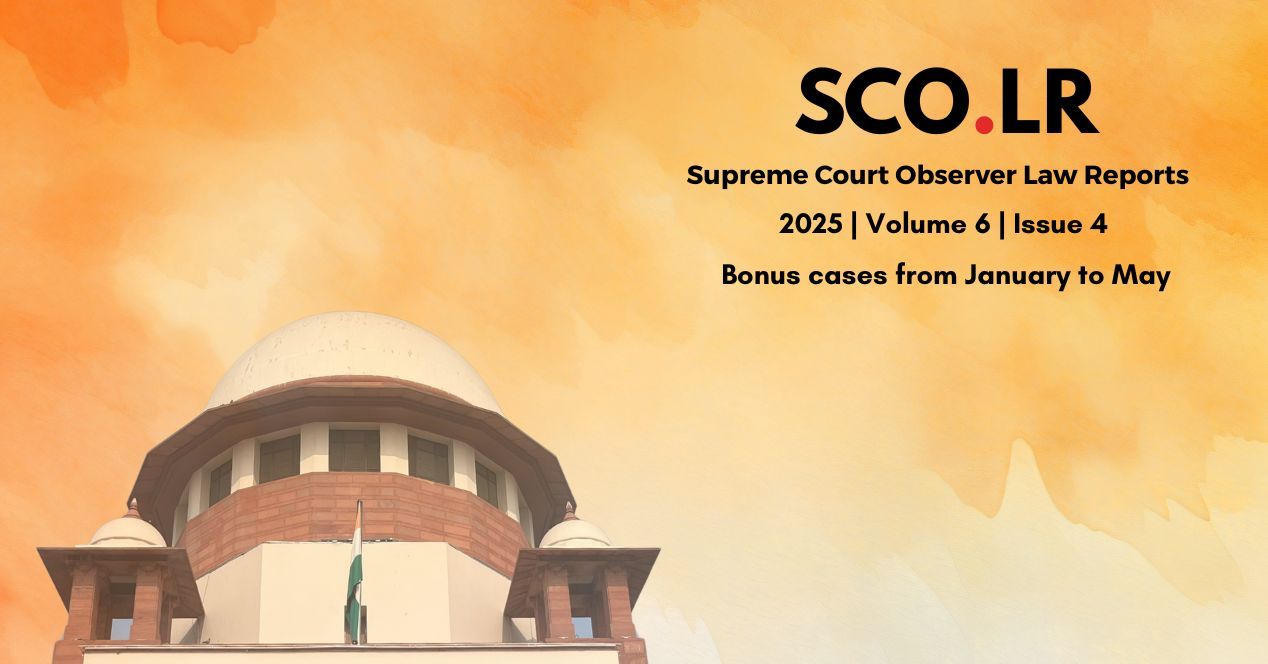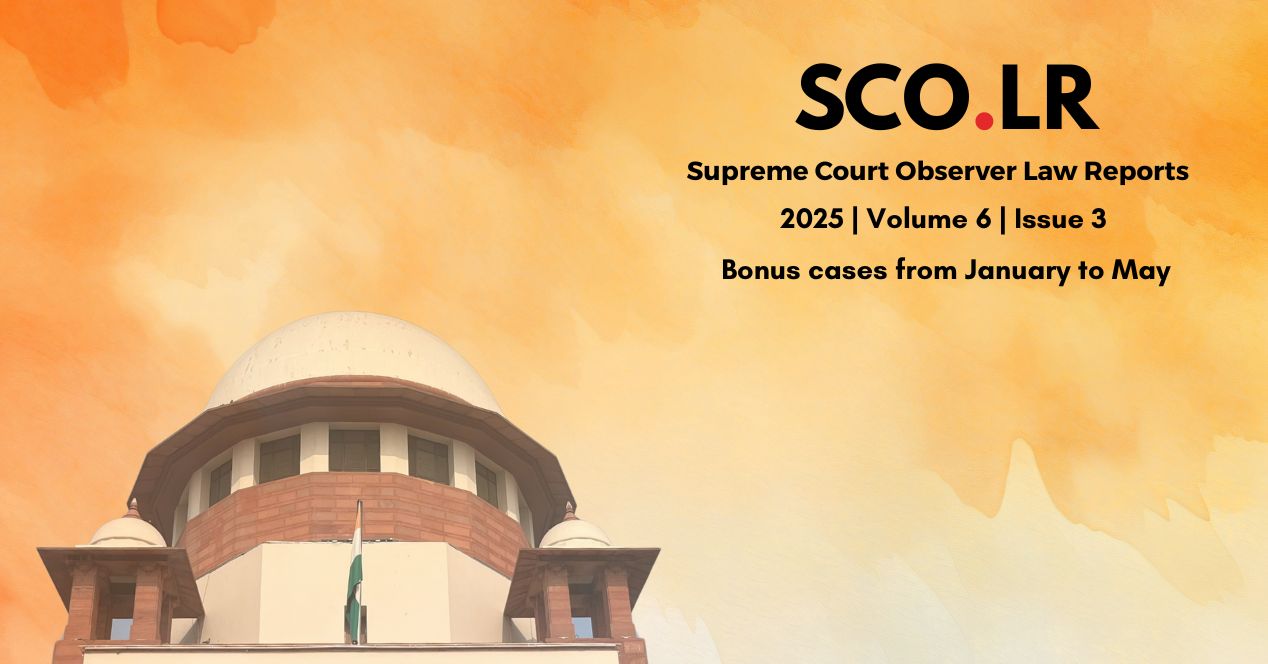Analysis
SCO.LR | 2025 | Volume 7 | Issue 3
In this Issue of SCO.LR, we summarise five significant and unmissable judgements from 14 July to 19 July 2025
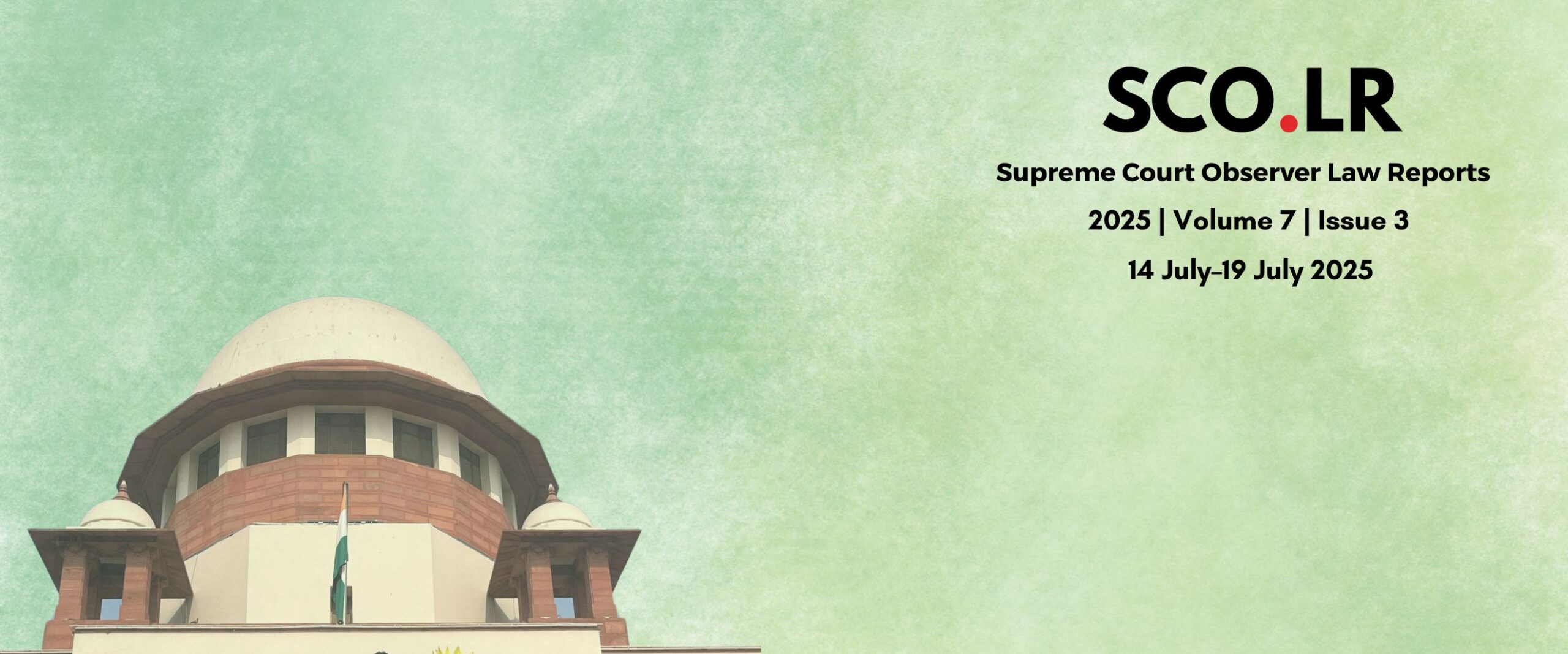
The Supreme Court had a productive start after its seven-week break from full-time operation. It delivered 56 new judgements in its first week back (goodbye bonus cases!)
We’ve identified five cases for this Issue of Supreme Court Observer Law Reports (SCO.LR). The list includes the evidentiary value of phone call recordings in matrimonial disputes, mitigating factors in the death penalty, inheritance rights of women belonging to the Scheduled Tribe community and more! You can access these judgements in HTML format on SCO.LR page.
Did we miss a case which you thought should have been in SCO.LR? Write to us at admin@scobserver.in!
**********
The Supreme Court Observer Law Reports
SCO.LR | Volume 7 | Issue 3
14 July–19 July 2025
**********
Evidentiary Value of Secretly Recorded Phone Calls Between Spouses in Marital Disputes
14 July 2025
Citations: 2025 INSC 829 | SCO.LR 7(3)[11]
Bench: Justices B.V. Nagarathna and S.C. Sharma
The Supreme Court held that a secretly recorded phone conversation between spouses is admissible as evidence and does not violate their right to privacy.
A Family Court in Bathinda had allowed an application by the husband seeking permission to submit memory cards of phones and transcripts of recorded conversations as evidence. The Punjab and Haryana High Court quashed the Bathinda Court Order stating that the conversations were recorded without the wife’s knowledge, which invaded her right to privacy.
The Supreme Court set aside the High Court’s decision. It stated that the recording cannot be considered inadmissible merely because it was “illegally obtained”. The Court clarified that privacy of communication between husband and wife granted under Section 122 of the Evidence Act did not extend to cases of dispute between them.
Keyphrases/words: Evidence Act—Section 122—communications during marriage—secret recording of phone calls in marriage—not a breach of right to privacy—conversation between spouses not privileged—matrimonial disputes
Read Judgement here.
Mind map**********
Weightage of Mitigation Report in Commuting Death Penalty
Byluru Thippaiah @ Byaluru Thippaiah @ Nayakara Thippaiah v State of Karnataka
16 July 2025
Citation: 2025 INSC 862 | 2025 SCO.LR 7(3)[12]
Bench: Justices Vikram Nath, Sanjay Karol and Sandeep Mehta
The Supreme Court held that a mitigation report prepared to determine the facts and circumstances of the crime warranting the death penalty should be considered in its entirety before confirming the sentence.
A Trial Court had imposed the death penalty on the appellant for the murder of his wife, sister-in-law and his three children. The punishment and the conviction were confirmed by the Karnataka High Court, which found that the crime had been pre-planned and executed.
The Supreme Court upheld the conviction but set aside the death penalty. It relied on the mitigation report, which found the appellant to have a “good moral character” and showed “good conduct” with co-prisoners and prison officials. The Court also factored in that the convict was mildly depressed and that he had lacked proper parental care due to the death of his parents. He had also attempted suicide on two occasions. The Court reasoned that the “sum-total of circumstances” that drove him to commit the “reprehensible crime” did not warrant the death penalty and commuted the sentence to life imprisonment without the scope of remission.
Keywords/phrases: Rarest of the rare—death penalty modified—mitigating circumstances to be considered as a whole—life imprisonment without remission
Read the Judgement here.
Mind map**********
Inheritance Rights of Tribal Woman in Ancestral Property
Date: 17 July 2025
Citations: 2025 INSC 865 | 2025 SCO.LR 7(3)[13]
Bench: Justices Sanjay Karol and Joymalya Bagchi
The Supreme Court held that a tribal woman is entitled to an equal share in her ancestral property. The Court held that the withholding of inheritance rights violated the principle of equality under Article 14.
The appellants sought the partition of their maternal grandfather’s property, claiming their mother had an equal share in it. The Trial Court, the First Appellate Court and the Chhattisgarh High Court dismissed this application, stating that the applicants had failed to establish their right over the property.
The Supreme Court set aside the High Court’s judgement. It held that the defendants had provided no proof of a custom which prohibited female succession. There was no rational nexus or reasonable classification for only males to be granted succession over the property.
Keywords/ phrases: Article 14–equality in inheritance–woman from Scheduled Tribe community—no proof of custom refusing inheritance rights to women—Chhattisgarh High Court judgement set aside
Read the Judgement here.
Mind map**********
Strictures and Remarks Against Judicial Officers in Judgements
Kaushal Singh v State of Rajasthan
18 July 2025
Citations: 2025 INSC 871 | 2025 SCO.LR 7(3)[14]
Bench: Justices Vikram Nath, Sanjay Karol and Sandeep Mehta
The Supreme Court held that High Courts should ordinarily refrain from passing strictures against judicial officers in their judgements while deciding matters.
The Rajasthan High Court had found a bail order by a District Judge-cadre officer to be “grossly inappropriate and cavalier” and accused him of negligence and disobedience. The bail order did not include the criminal antecedents of the accused persons.
The Supreme Court expunged the remarks against the officer. It held that the remarks were uncalled for and were made without providing the officer an opportunity to explain.
Keywords/ Phrases: Strictures and remarks against judicial officers—Courts to exercise restraint— Rajasthan High Court—remarks against District Judge cadre officer–strictures expunged
Read the Judgement here.
Mind map**********
Enabling Clauses in an Arbitration Agreement
BGM AND M-RPL-JMCT (JV) v Eastern Coalfields Ltd.
18 July 2025
Citations: 2025 INSC 874 | SCO.LR 7(3) [15]
Bench: Justices P.S. Narasimha and Manoj Misra
The Supreme Court held that the usage of the phrase “may be sought through arbitration” in an agreement does not mandate arbitration as a mode of dispute resolution.
BGM AND M-RPL-JMCT (JV) invoked arbitration proceedings under Clause 13 of its General Terms and Conditions (GTC) after a dispute with Eastern Coalfields Ltd. The Clause stated that disputes “may be sought” through the Arbitration Act, 1996. The Calcutta High Court held that the word “may” indicated no clear intention to arbitrate.
The Supreme Court upheld the High Court’s decision, noting that Clause 13 of the GTC did not amount to an arbitration agreement between the parties. It was merely a provision that left the option open.
Keywords/phrases: Arbitration and Conciliation Act, 1996—Section 11—appointment of an arbitrator—arbitration clause has “may”—Calcutta High Court holds not binding on parties—Supreme Court upholds High Court’s decision
Read the Judgement here.
Mind mapReceive the latest Issue of SCO.LR straight to your inbox every Monday. Sign up here.

